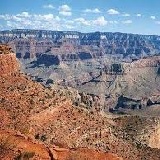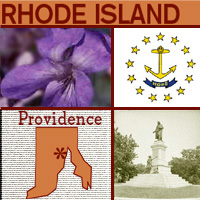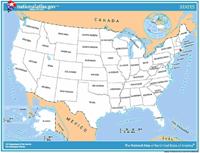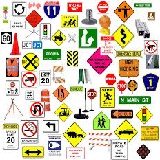|
Additional Lessons |
 About These
Lessons About These
Lessons
The following classroom lessons are great for students
who want additional listening and reading practice. |
-
Travel America -
Beginner
Level. Do you love America and American
English? Learn before you travel. Facts and other
cool stuff about your favorite U.S. state. Great
English reading practice.
|
 Travel
America - Rhode Island Travel
America - Rhode Island
(Beginner -
Reading)
Learn some interesting facts and read interesting
stories about Rhode Island. |
 Rhode
Island Rhode
Island
Roger Williams and a group of religious followers
founded the town of Providence in what is today
known as Rhode Island after their banishment from
the Massachusetts Bay Colony. Williams believed in
the importance of liberty of conscience, which
became an important principle in the founding of
Rhode Island and ultimately in the founding of the
United States. Officially called "The State of Rhode
Island and Providence Plantations," Rhode Island is
one of the six New England states and one of the
original 13 states of the Union, entering in 1790.
It is the smallest state in area in the country.
Rhode Island's flower is the violet, and the capital
is Providence. The name "Rhode Island" is credited
to Italian navigator Giovanni Verrazano who compared
the nearby island Block Island to Rhodes in Greece.
Later Williams thought that Verrazano had been
referring to island where they had settled and began
calling the island Rhode Island. |
 Rhode Island
State Flag Rhode Island
State Flag
The flag of Rhode Island is white, bearing on each
side in the center a gold anchor, underneath it a blue
ribbon with the state motto ("Hope") in gold letters, and
surrounded by thirteen golden stars in a circle,
representing the original 13 states. The flag design adopted
in 1877 also stipulated that; "The flag shall be edged with
yellow fringe."
The Rhode Island General Assembly first adopted a seal for
the colony in 1664 which contained an anchor with the word
"Hope" above it (Rhode Island's state seal). The use of the
word "Hope" was probably inspired by the biblical phrase
"hope we have as an anchor of the soul." |
|
Source:
State Symbols USA |
|
|
 Rhode Island
State Facts Rhode Island
State Facts
Picture: state seal of Rhode Island |
|
State Capital |
Providence |
|
Nickname |
The Ocean State / Little Rhody |
|
Motto |
Hope |
|
Statehood |
May 29, 1790 (13th) |
|
Origin of Name |
Possibly named in honor of the Greek island of
Rhodes or named Roode Eylandt by Adriaen Block,
Dutch explorer, because of its red clay. |
|
Largest Cities |
Providence, Warwick, Cranston, Pawtucket, East
Providence |
|
Border States |
Connecticut, Massachusetts |
|
Area |
1,045 sq. mi.; Smallest state |
|
State Bird |
Rhode Island Red |
|
State Flower |
Violet (viola) |
|
State Tree |
Red Maple (acer rubrum) |
|
State Song |
Rhode Island's It For Me |
 Travel and
tourism site for Rhode Island - This state travel and
territorial tourism site provides ideas for your vacations,
meetings, and more. Travel and
tourism site for Rhode Island - This state travel and
territorial tourism site provides ideas for your vacations,
meetings, and more. |
|
|
Rhode Island Stories |
|
|
Wickford Arts Festival
Did you know that Rhode Island has more artists per person than any
state in the country? The town of Wickford celebrates this fact by
holding an arts festival every July. Started in 1962, the Wickford
Arts Festival has grown in size and importance. Today, artists from
around the world compete for the few spaces that become available
each year to exhibit their wares. A percentage of the space is
reserved for local artists.
Close to 100,000 people attend the two-day festival, which is
devoted to fine art, photography, and three-dimensional art. The
Wickford Arts Festival is a "juried" show; that is, if you want to
exhibit your art in the festival, you must submit a sample of your
work to be judged. The judges consider originality, workmanship and
presentation when making their choices on who is allowed to exhibit
in the show. What's your favorite type of art? |
|
|
The Narragansett Indian Tribe
The Narragansett Indian Tribe lived in what is now known as Rhode
Island, long before Europeans settled there. The Narragansett were
made up of several sub-tribes, each with a chief (sachem). They
survived by farming corn, hunting, and fishing.
Europeans first came into contact with the Indians of Rhode Island
in 1524, when the explorer Giovanni de Verrazano visited
Narragansett Bay. He described a large Indian population organized
under powerful "kings." Europeans didn't settle this area until
1635. The Narraganset and Europeans maintained good relations until
King Philip's War in 1675-76. This war was the last major effort by
the Indians of southern New England to drive out the English
settlers who wanted more and more Indian land. But the Narragansett
were completely defeated.
After the war, the remaining Narragansetts were forced to live on
reservation lands, but by the end of the 18th century, the
reservation lands had been drastically reduced. The state of Rhode
Island "detribalized" the Narragansett during 1880-1884, which meant
that they were no longer recognized as a tribe.
Over the years, the Narragansett tried to maintain their tribal
customs and traditions, but it wasn't until the 1970s that they were
able to reclaim part of their land and the 1980s before they
received federal recognition as a tribe. It took decades, but the
persistence of the Narragansett at getting back a part of what
belonged to them finally paid off. |
|
|
Looff Carousel
Take a ride on a work of art by hopping onto a carousel! Hand-made
carousels, also called merry-go-rounds, are a form of folk art that
was once very popular. Unfortunately, many early handmade carousels
have been disassembled and sold off in pieces.
The Looff Carousel at Crescent Park in East Providence, Rhode
Island, is one of the few handmade carousels still in use. It was
designed and built in 1895 by Charles I.D. Looff, a native of
Denmark, who was one of the earliest and most important
manufacturers of carousels. Still functioning on its original site
more than 100 years later, the Looff Carousel is one of the finest
surviving examples of a once common American folk art. Because of
its cultural significance, the Looff Carousel was entered into the
National Register of Historic Sites and Places on April 21, 1976.
Did you know there is a lead horse on a carousel? According to
carousel legend, the lead horse is always the biggest, most
decorative horse. Often the lead horse is a military or war horse.
If a chariot (a two or four-wheeled horse-drawn carriage) is
included in the carousel, the first horse just behind it on the
outside is the lead horse. On some carousels, the horses move up and
down as if they were galloping, so riders get a sense of what it is
like to ride a real horse. Next time you get the chance, hop onto a
carousel, you may even get to ride the lead horse! |
|
|
Samuel Slater of Rhode Island
Who was Samuel Slater and what is he famous for?
During the late 18th and early 19th centuries, Rhode Island became a
pioneer in manufacturing in the United States. One of the
individuals who played a big role in Rhode Island's economy was
Samuel Slater.
Rhode Island was especially strong in textile manufacturing. The
state, along with other parts of the Northeast, was part of the
American Industrial Revolution, when the economy, which had been
based on agriculture, became one based on machines and industries.
Slater established his first mill in 1790 on the Blackstone River in
Rhode Island. It was one of the first factories in the United
States. Three years later, in Pawtucket, he built Slater Mill, the
first American factory to successfully produce cotton yarn with
water-powered machines.
Other mills were established throughout Rhode Island and New
England. By the first half of the 19th century, there were more than
100 mills in Rhode Island that employed thousands of men, women, and
children. Factory owners liked to hire women and children because
they could pay them lower wages than they paid men. |
|
|
Gaspee Days
The Boston Tea Party, which took place on December 16, 1773, is the
best known of the early protests by U.S. Colonists against British
rule. But it actually followed another conflict that some people
refer to as the "first real blow for freedom." Have you heard of it?
The incident occurred in Narragansett Bay, Rhode Island, in June
1772, when American Colonists burned the British ship HMS Gaspee.
The Americans were tired of the unfairness of King George III, who
placed taxes on everything from glass to stamps to tea. King George
had sent the Gaspee to Naragansett Bay to enforce his orders and
prevent smuggling.
The HMS Gaspee. was under the command of Lieutenant William
Dudingston, who required that all other ships lower their flags as a
sign of respect to his ship. As a result, Dudingston was not well
liked. When the American vessel Hannah refused to lower its flag,
the Gaspee chased it and the captain of the Hannah deliberately
lured the Gaspee across shallow waters and left the British ship
stranded on a sandbar, unable to move. Late that night, 64 Rhode
Islanders rowed out to the Gaspee, boarded the ship, took the crew
prisoners, shot Dudingston, and set the vessel on fire.
The citizens of Warwick, Rhode Island, celebrate this event every
June. The events include a ball, a children's Colonial costume
contest (like the one the girls in the photo are wearing), Colonial
dinners, and a staging, or re-enactment, of the event. |
|
Source:
Library of Congress |
|
 Rhode
Island Rhode
Island
There are no national forests, parks, or
monuments in this state. |
|
|
|
 Travel
America Travel
America
Do you love America and American English? Learn before
you travel. Facts and other cool stuff about your
favorite U.S. state. Visit the Fun Easy English Travel
America pages. Read about the beautiful National
Forests, Parks, and Monuments. Great English reading practice. |
 Drive America Drive America
Planning to drive in America? Learn the rules and
regulations. Great English reading practice. |
|